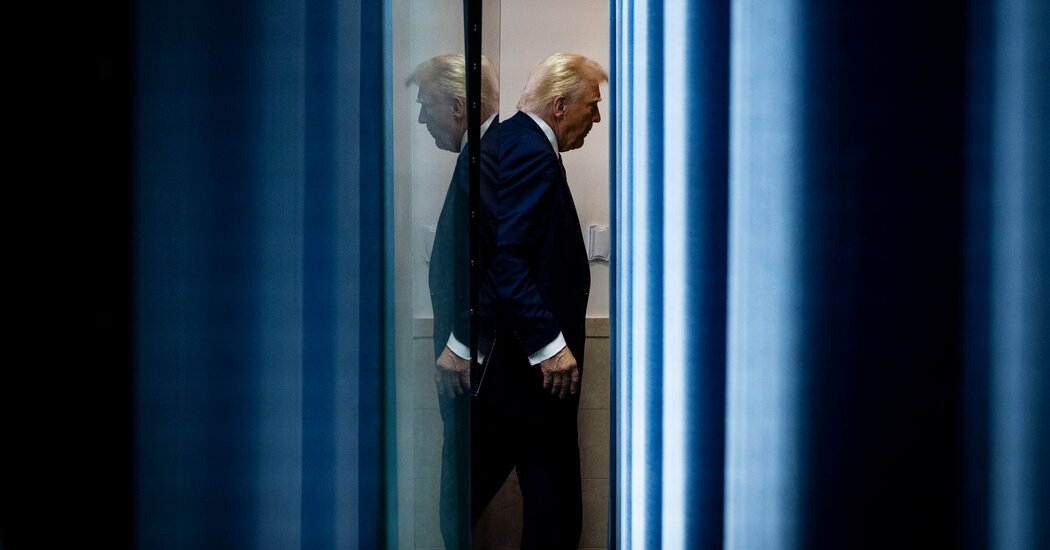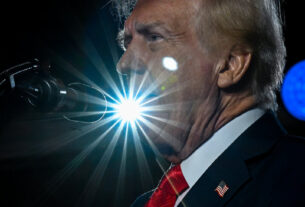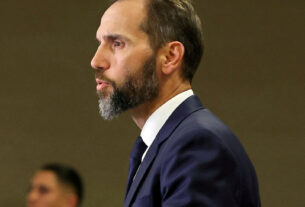The demoralization and fear gripping blue America in the early weeks of President Trump’s administration have left liberal groups and their allies struggling for cash, hurting their ability to effectively combat the right-wing transformation of the federal government.
The small-dollar online spigot that powered opposition to the first Trump administration has slowed to a trickle as shaken liberal voters withhold their donations.
Charitable foundations that have long supported causes like voting rights, L.G.B.T.Q. equality and immigrants’ rights are pulling back, devoting time to prepare for expected investigations from the Republican-led Congress.
And some of the country’s biggest liberal donors have paused giving, frustrated with what they see as Democrats’ lack of vision and worried about retaliation from a vengeful president. Some Democrats say a few of their reliable donors are now openly supporting Mr. Trump, or at least looking to curry favor with him.
Fund-raising slowdowns are common after a presidential defeat and before marquee midterm races fully begin. But interviews with more than 50 donors, strategists and leaders of activist organizations show that many Democrats believe this year is different.
While Mr. Trump has not taken action against any liberal groups or lawmakers, Democrats worry his frequent threats of retribution during the campaign have led to a chilling effect on the charitable foundations and nonprofit advocacy groups that have long been pillars of the country’s civil society.
Jeff Skoll, a Silicon Valley billionaire and a longtime friend of Elon Musk’s, said there was “an awful lot of pressure” to side with Mr. Trump.
This month, Mr. Skoll, who has donated tens of millions to Democratic candidates and causes in recent years but said he did not vote in the 2024 presidential election, posted a photo on social media of himself standing with Mr. Trump backstage at the inauguration. On Friday, he had breakfast in Palm Beach, Fla., with Senator Chuck Schumer of New York, the minority leader, where they discussed the prospect of Mr. Schumer’s using Mr. Skoll to back-channel ideas to the president, Mr. Skoll said.
Mr. Schumer recalls the conversation differently, according to an aide, Allison Biasotti.
In an interview, Mr. Skoll acknowledged his unique position, saying he had heard from many others who were frightened to fund opposition to the administration.
“There are people who were absolutely against Trump, never Trumpers, who fear that they’ll be retaliated against and they’ll have to leave the country,” Mr. Skoll said. “Folks who wish to oppose him — it may take some time before they gather up the courage.”
The result is a political environment that is strikingly different from 2017, when money poured into Democratic causes, fortifying existing organizations and seeding a flowering of new groups to fight different parts of Mr. Trump’s agenda.
Now, some of those same organizations are struggling to survive, in part because few new major liberal donors have emerged since 2017. Groups that support L.G.B.T.Q. rights, promote gender equity and champion other progressive causes have cut staffing and announced that longtime leaders are leaving.
End Citizens United, a left-leaning group that aims to overhaul campaign finance laws, laid off its six senior staff members last month as part of a restructuring. Run for Something, which works to elect liberal down-ballot candidates, laid off 35 percent of its staff late last year. And GLSEN, a group dedicated to protecting L.G.B.T.Q. students, laid off 25 people last month.
“No one is giving until they see a plan for how we are going to better navigate this unprecedented situation and stop acting like this is a normal administration,” said Alexandra Acker-Lyons, a political consultant who is close to Silicon Valley donors.
Worries about ‘repercussions’ from Trump
The downsizing has reached some of the most storied brands in Democratic politics.
Human Rights Campaign, the nation’s largest L.G.B.T.Q. advocacy group, laid off 20 percent of its staff in what it called a “strategic restructure.” This month, the Center for American Progress, the party’s most prominent policy group, cut 22 people — 8 percent of its staff.
“It was the right time to reset our staffing in the environment we find ourselves in,” said Colin Seeberger, a C.A.P. spokesman.
Not all of the party’s biggest funders feel quite as confident.
Aides to Reid Hoffman, the billionaire LinkedIn co-founder and one of the biggest Democratic donors, have signaled that he is now much more reluctant to fund progressive political projects. A spokeswoman for Mr. Hoffman said that “he thinks that the Democratic Party strategy needs to reform, and when it does, he’s happy to hear new ideas and new pitches.”
Mr. Hoffman has also voiced publicly what many donors have said privately: He expects retaliation from Mr. Trump.
“There’s a greater than 50 percent chance that there will be repercussions from a misdirection and corruption of the institutions of state to respond to my having tried to help Harris get elected,” he said on the podcast “The Diary of a CEO.”
Cooper Teboe, a strategist in Silicon Valley, said about a half-dozen major donors had told him they were temporarily pausing political giving out of fear of political retribution. He said he believed donors would be back in full force by May, as anger toward Mr. Trump rose.
“‘We don’t know if he’s going to go after people,’” Mr. Teboe said, paraphrasing the donors. “‘We do not want to be on the top of that list. We’re going to hold off and see if he really is, or if it’s all bluster.’”
Some donors are hiring additional legal counsel to address worries about tax audits, congressional investigations and lawsuits. Others are moving assets overseas, or at least their foundations to Democratic-controlled states.
Donors increasingly want to stay anonymous, which could slow the flow of cash to Democratic super PACs because they must eventually disclose their donors.
Liz Minnella, a top Democratic fund-raiser, started a political group this year, Connect Forward, to help create a media ecosystem of liberal voices. She said she structured it as a nonprofit 501(c)(4) organization — which does not have to disclose its donors — in part because she was “prioritizing protecting our donors” from possible retribution.
At a November meeting of the Democracy Alliance, a liberal donor network, funders were advised on steps to protect themselves from lawsuits, audits and investigations. To limit legal risk, the group is also considering changing its document retention policies to hold digital communications for only a month.
Much of the concern centers on legislation in Congress that would remove the tax-exempt status of nonprofit groups that are found to be supporting terrorist organizations.
After Mr. Trump won the election, the Democracy Alliance urged its donors to lobby against the bill during the lame-duck session, fearing it could be weaponized against progressive groups and could even be used to shutter ActBlue, the online fund-raising platform.
During a presentation to Democracy Alliance donors, former Representative Donna Edwards, a Maryland Democrat, flashed a slide showing all Democratic members of Congress who had cast “yes” or “absent” votes for the measure in the past. She encouraged donors to push them to change their positions.
The bill passed the House last year but died in the Senate. Democrats worry that Republicans, who now fully control Congress, could pass the bill into law.
Pamela Shifman, the group’s president, said the possibility of retribution only made donors’ work more critical.
“Their goal is to intimidate us and wear us down,” she said of the Trump administration. “Our strategy is to step up and step into a fight for democracy.”
Unease extends into the offices of prominent foundations, whose leaders fear being hauled into high-profile congressional hearings similar to those that damaged the reputations of top college presidents in 2023.
Not everyone is dialing back. On Wednesday, aides to George Soros, one of the Democratic Party’s largest donors, helped gather a number of major contributors and players in Washington, including Senators Cory Booker of New Jersey and Tina Smith of Minnesota. The group talked about the progressive media landscape and plotted future investments, according to three people with knowledge of the event, who insisted on anonymity because it was private.
But some donors are putting new requirements on the cash they hand out. Many remain frustrated that the $1.5 billion frenzy of spending to elect former Vice President Kamala Harris resulted in defeat.
They want to know what, exactly, Democrats plan to do differently in the future. Some are demanding more detailed information about the plans and specific targets of liberal groups — including the main pro-Harris super PAC, Future Forward — and candidates before continuing their contributions.
“People are mostly on the ropes or on the mat waiting for leadership, scratching our heads and giving grace to Schumer and Jeffries, who are saying, ‘Pick your battles,’” said Robert Raben, a Democratic consultant, referring to Representative Hakeem Jeffries, the House Democratic leader.
John Morgan, a wealthy Florida donor who was a vocal supporter of former President Joseph R. Biden Jr., said he was thinking more carefully about his future contributions to the Democratic Party and its candidates. He is not worried about retribution from the new administration. But he is furious with what he sees as Democrats’ tactical missteps and wasteful spending during the election.
“For me, it’s going to be giving to people, not party,” said Mr. Morgan, who now considers himself an independent. “The D.N.C. learned nothing from the last election.”
A few Democrats are still coming to terms with their party’s actions last year.
Late last month, Dmitri Mehlhorn, a former adviser to Mr. Hoffman who remains close to him, emailed his political list complaining that Democrats should not have committed what he called “Bidencide” by pressuring the former president to exit the race.
“I believe the USA is entirely over as the kind of political project that lends itself to your work,” wrote Mr. Mehlhorn, who will not be around to directly experience the consequences of Democrats’ defeat.
He has moved to Canada.





